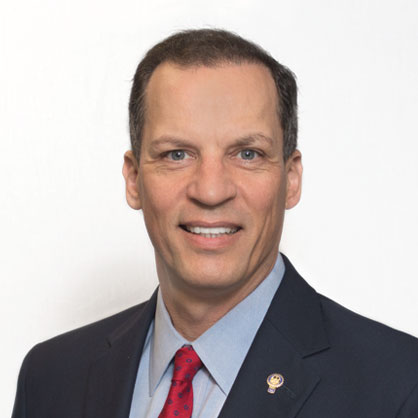WFSB-TV3: Malloy Will Not Seek Third Term as CT Governor
Gov. Dannel Malloy announced that he will not seek a third term as the governor of Connecticut.

Ed.D. Higher Education Administration, Northeastern University
M.A. Public Policy , Trinity College
B.S. Criminal Justice with a Minor in Political Science, University of New Haven
Dr. Reynolds has 25 years of experience in local, state, and federal government. He has been teaching political science and public policy at the University since 2014. He received the University’s 2018 Excellence in Teaching Award.
Dr. Reynolds was elected State Representative of the 42nd District in the Connecticut General Assembly in 2004 and re-elected in 2006, 2008 and 2010. He rose to Deputy Majority Leader of the House of Representatives, the chamber's fourth highest ranking member.
He served as Vice Chair of Public Safety and Security Committee and member of the Education Committee and Planning and Development Committee. He served as a member of the powerful Appropriations Committee, as Chair of its Regulation & Protection Subcommittee, Chair of its General Government Subcommittee, and member of its Elementary and Secondary Education Subcommittee, and Results-Based Accountability Subcommittee. He represented the State of Connecticut on the Council of State Government’s Education Committee and the New England Secondary School Consortium (NESSC).
Dr. Reynolds was a leader in the legislature on many issues, including budget and tax reform, government performance and accountability, education, regionalization of municipal services, drunk driving, and casino impact aid. He received wide recognition for raising public awareness of and inspiring a legislative response to Connecticut’s systemic fiscal crisis following his authorship of two policy reports, including Crisis: A Terrible Thing to Waste—Connecticut’s Budget Dilemma and the Opportunity for Reform and Wake Up Call: Connecticut’s Fiscal and Economic Crisis and a Roadmap for Recovery and Reform.
Prior to his election to the General Assembly, Dr. Reynolds was elected to the Ledyard Town Council from 2003-04 and was a member of the Education Committee and Transportation Task Force of the Connecticut Conference of Municipalities (CCM). He was elected to the Ledyard Board of Education from 1995-2003 and served as Chairman of the Board from 1999-2003. He was elected to the Board of Directors of the Connecticut Association of Boards of Education (CABE).
His first political role was as a Congressional Aide in the United States Senate. He has worked on dozens of local, state, and national political campaigns.
Learner-centeredness brings clarity to my conception of what learning looks like and to the distinctive roles that my students and I assume in and out of the classroom. Learning is not done to my students but rather something my students do. Therefore, I focus on the learner and the learning process, not on the delivery of content. Learning is a process, not a product. Thus, I can only advance learning by influencing what my students do to learn. Learning results from my students’ engagement in academic experiences, not the memorization of facts. These experiences require their active engagement, not a passive posture. My students have agency in the learning process and must take ownership of their learning. Ultimately, learning outcomes are achieved when my students reveal evidence of change in understanding, assumptions, and attitudes, not the acquisition of content.
American democracy is endlessly fascinating to me. With each passing decade as a practitioner and now as a teacher of politics, I am increasingly in awe of what our founders designed and the sheer resilience of their experiment. More so than ever, the strength of American democracy—and we as its trustees—will influence the course of world events and inspire or hinder struggling democracies. So, it matters how we "do" politics in America.
Millennials and Generation Z, the cohorts to which most University of New Haven undergraduates belong, will soon inherit responsibility for our politics and government. However, surveys reveal that young people have no confidence that government and politics are a legitimate vehicle for change. What is the future of American democracy if young people are not engaged? What are the consequences for the world if the strength of our democracy is not bolstered by the next generation?
My mission in teaching political science is to inspire my students to think about their role in our democracy and the role of our democracy in the world.